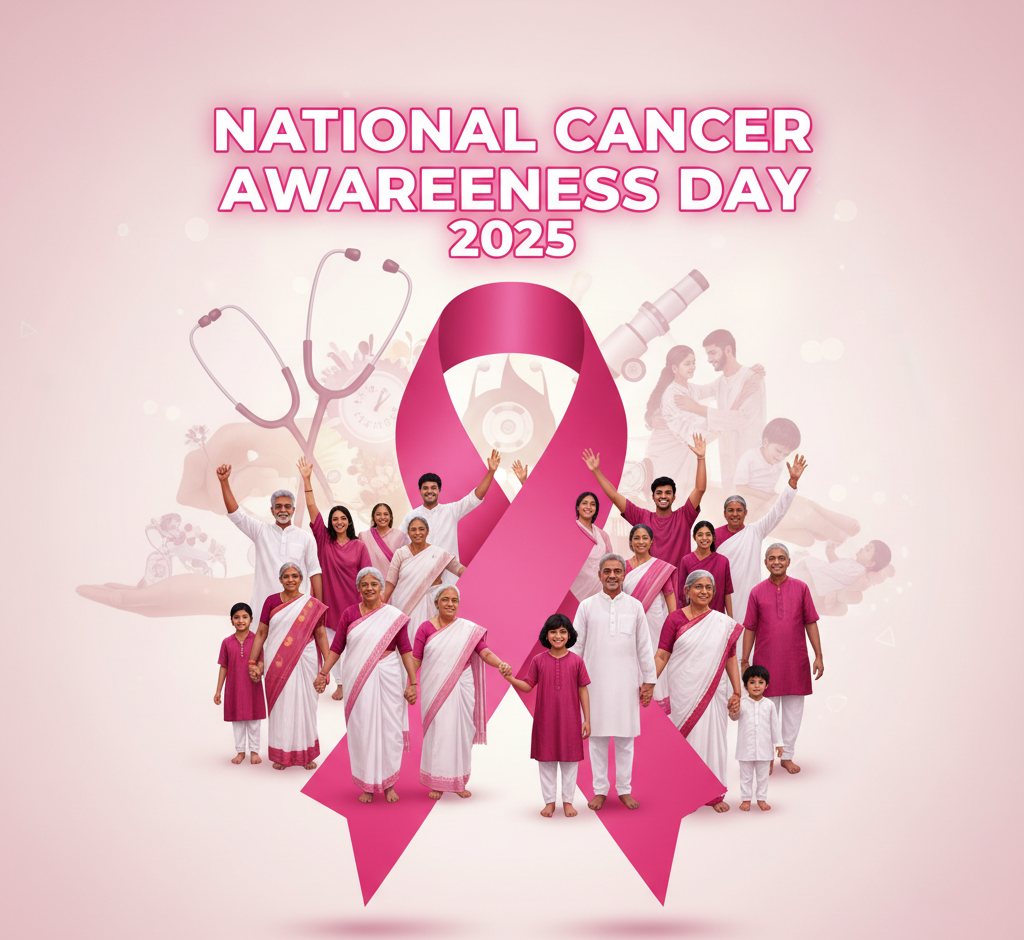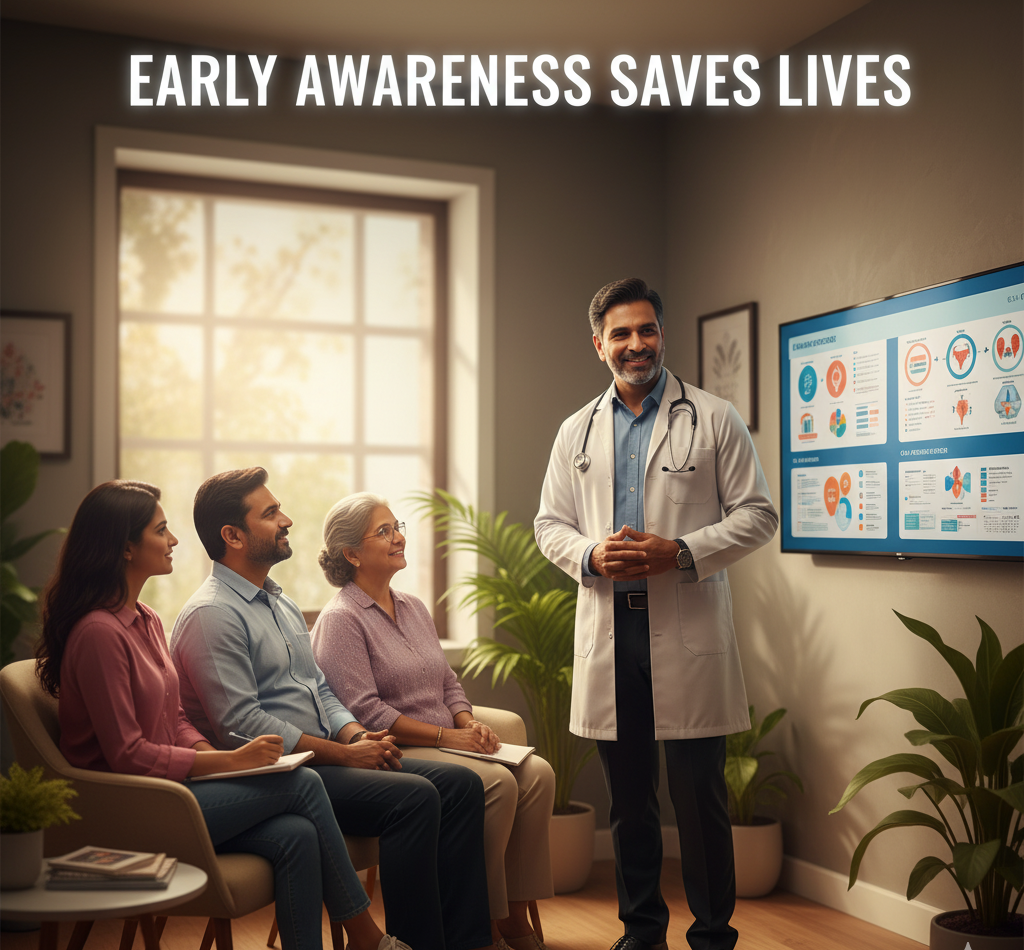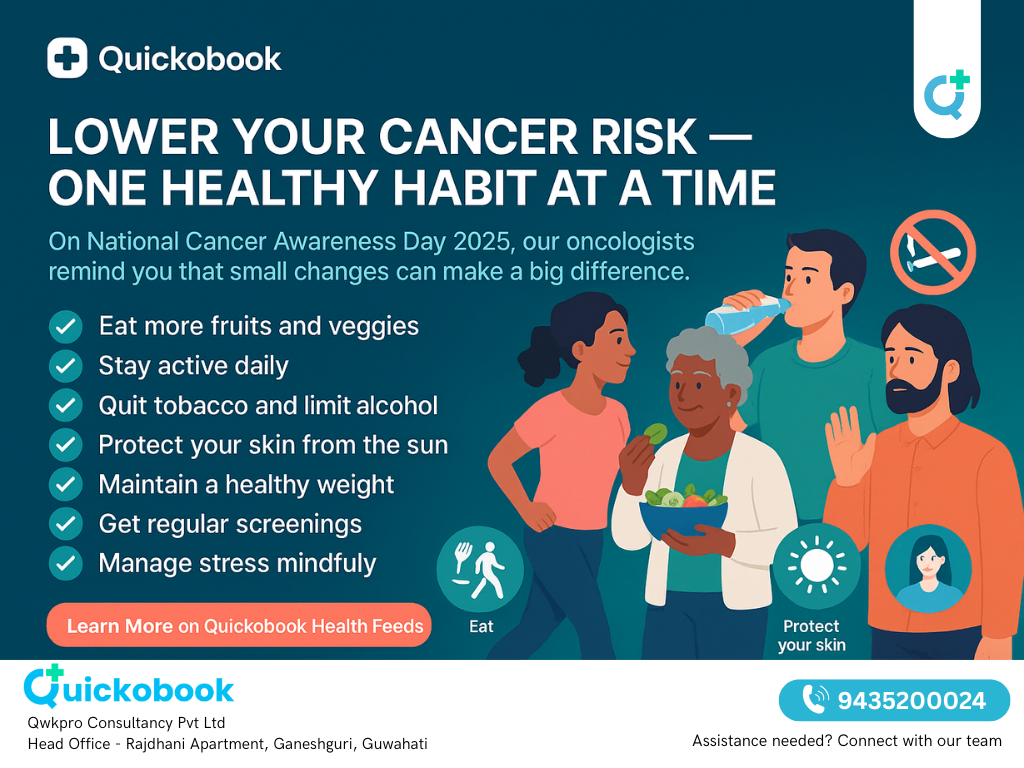Introduction
Every year, National Cancer Awareness Day, observed on November 7, reminds us that early action saves lives. Cancer remains one of India’s most serious health challenges—with over 14 lakh new cases reported annually. Yet, experts say nearly 40% of cancers are preventable through simple lifestyle changes.
To mark National Cancer Awareness Day 2025, leading oncologists share evidence-based, everyday habits that significantly reduce cancer risk. From eating right to quitting tobacco, these small but powerful choices can safeguard your health and that of your family.

Understanding Cancer and Prevention
Cancer occurs when abnormal cells grow uncontrollably, damaging tissues and organs. While genetics play a role, lifestyle and environment account for the majority of cases.
Cancer prevention means adopting healthy habits to lower your risk of developing the disease. These habits don’t just protect you from cancer—they also improve overall immunity, energy, and longevity.
7 Everyday Habits to Lower Cancer Risk — Oncologist Tips
1. Eat a Balanced, Colourful Diet
Nutrition plays a powerful role in cancer prevention.
- Include 5+ servings of fruits and vegetables daily—they’re rich in antioxidants that protect cells.
- Choose whole grains (brown rice, oats) over refined ones.
- Limit red and processed meat.
- Use healthy oils like mustard, olive, or sunflower instead of hydrogenated fats.
Oncologist Tip: “A diet rich in fiber, antioxidants, and plant-based foods reduces inflammation and cellular damage—two major cancer triggers.”

2. Stay Physically Active
Exercise helps regulate hormones and strengthens the immune system.
- Aim for at least 150 minutes of moderate activity per week—brisk walking, yoga, or cycling.
- Avoid prolonged sitting; take short movement breaks every hour.
Oncologist Tip: “Even 30 minutes of daily movement can lower breast, colon, and lung cancer risk significantly.”
3. Avoid Tobacco in All Forms
Tobacco is linked to over 30% of cancer deaths in India.
Whether smoked or chewed, it damages DNA and promotes uncontrolled cell growth.
- Quit smoking and avoid secondhand smoke.
- Avoid gutka, khaini, and betel quid, which increase oral cancer risk.
- Seek medical help for de-addiction if needed.
Oncologist Tip: “The risk of oral and lung cancer begins to drop within months of quitting tobacco.”
READ ALSO: The Rising Tide Of Cancer In Young Adults: Are We Facing A Real Epidemic?

4. Limit Alcohol Consumption
Alcohol acts as a carcinogen—it increases risks of liver, breast, and esophageal cancer.
- If you drink, keep it minimal (≤1 drink/day for women, ≤2 for men).
- Stay hydrated and prioritize alcohol-free days.
Oncologist Tip: “Cutting back on alcohol supports your liver and reduces the risk of multiple cancers.”
5. Protect Your Skin from UV Rays
Excessive sun exposure damages skin cells and may lead to skin cancer.
- Use SPF 30+ sunscreen daily, even indoors.
- Avoid direct sunlight between 10 AM – 4 PM.
- Wear protective clothing and hats.
Oncologist Tip: “Melanin protects but doesn’t make Indians immune—UV rays still cause DNA damage.”
6. Go for Regular Screening and Vaccination
Early detection is key.
- Schedule regular screenings: mammograms, Pap smears, colonoscopies.
- Get vaccinated for HPV (cervical cancer) and Hepatitis B (liver cancer).
Oncologist Tip: “Regular screening finds precancerous changes early—before symptoms appear.”
7. Manage Stress and Sleep Well
Chronic stress weakens immunity and may indirectly raise cancer risk.
- Practice mindfulness, yoga, or meditation.
- Get 7–8 hours of sleep nightly.
- Spend time with loved ones and limit screen time.
Oncologist Tip: “Sleep is your body’s natural repair time—don’t compromise on it.”
Why Cancer Prevention Matters in India
India faces unique cancer challenges—late diagnosis, lifestyle risks, and limited awareness.
Common cancers include breast, cervical, oral, and lung cancer—many of which are preventable.
Simple lifestyle steps, regular screening, and early consultation with oncologists can change outcomes dramatically.
When to See a Doctor
See a doctor if you notice:
- Persistent lumps, sores, or unexplained bleeding
- Sudden weight loss or fatigue
- Long-lasting cough, voice change, or swallowing difficulty
- Unusual changes in skin or moles
You can book an appointment with a certified oncologist on Quickobook for expert screening, consultation, and guidance.
Quickobook Health Blog Expert Summary
- Most cancers are preventable with early action.
- Healthy diet, no tobacco, and regular screening are key.
- Oncologists emphasize lifestyle over fear—prevention is power.
Visit Quickobook.com to consult top oncologists and general physicians near you.
50 Frequently Asked Questions (FAQs)
Q1. What is National Cancer Awareness Day?
A day observed on November 7 in India to promote cancer awareness and early detection.
Q2. Why is cancer prevention important?
It helps reduce your lifetime cancer risk and improves quality of life.
Q3. Can diet really prevent cancer?
Yes. Antioxidant-rich foods lower cell damage linked to cancer.
Q4. How much exercise helps?
At least 30 minutes daily or 150 minutes weekly.
Q5. Can smoking a few cigarettes cause cancer?
Even occasional smoking increases cancer risk.
Q6. Is alcohol-free beer safe?
It’s safer, but excessive intake still strains the liver.
Q7. What are common cancer symptoms?
Unusual lumps, fatigue, bleeding, weight loss, or skin changes.
Q8. Does stress cause cancer?
Indirectly—it affects immunity and hormone balance.
Q9. Is cancer genetic?
Some are, but lifestyle plays a larger role for most people.
Q10. How often should I get screened?
Once a year or as advised by your doctor.
Q11. Can herbal medicines cure cancer?
No, only evidence-based medical treatment should be used.
Q12. What is the link between obesity and cancer?
Excess fat raises estrogen and insulin levels, increasing cancer risk.
Q13. Are men or women more likely to get cancer?
Both are at risk; certain types are gender-specific.
Q14. Can secondhand smoke cause cancer?
Yes, prolonged exposure increases lung cancer risk.
Q15. How does HPV cause cancer?
It triggers changes in cervical cells, leading to cancer over time.
Q16. Should I take supplements for cancer prevention?
Only under medical supervision; whole foods are better.
Q17. Can pollution cause cancer?
Yes, air pollution increases lung and throat cancer risk.
Q18. Is skin cancer common in India?
Less common but rising, especially among fair-skinned individuals.
Q19. Can cancer spread from person to person?
No, cancer is not contagious.
Q20. What role does sleep play?
Adequate sleep boosts immunity and cellular repair.
Q21. How can I reduce breast cancer risk?
Maintain weight, breastfeed, and avoid alcohol.
Q22. Can turmeric prevent cancer?
Curcumin has anti-inflammatory properties, but not a cure.
Q23. Are sugar and cancer linked?
High sugar intake promotes obesity and inflammation.
Q24. Is organic food better for prevention?
It may reduce exposure to pesticides.
Q25. Can regular check-ups detect cancer early?
Yes, screening detects precancerous changes.
Q26. Does mobile radiation cause cancer?
Current evidence is inconclusive.
Q27. Can I reverse cancer risk at any age?
Yes, lifestyle changes benefit all ages.
Q28. Are vaccines available for all cancers?
No, but HPV and Hepatitis B vaccines help prevent two major types.
Q29. How can I support a cancer patient?
Offer emotional, physical, and social support.
Q30. Can cancer occur without symptoms?
Yes, some cancers are silent early on.
Q31. Should I get a genetic test?
If you have a strong family history, consult your doctor.
Q32. How to check for oral cancer at home?
Look for persistent ulcers, lumps, or white patches.
Q33. What is the first step after diagnosis?
Consult an oncologist for staging and treatment planning.
Q34. Is fasting helpful?
No medical proof supports fasting as cancer prevention.
Q35. Does hair dye cause cancer?
Some dyes have chemicals linked to cancer risk with prolonged use.
Q36. How can rural India fight cancer better?
Through mobile screening camps and awareness drives.
Q37. Are women more prone to cervical cancer?
Yes, due to HPV infection.
Q38. Can stress management really help?
Yes, it reduces hormonal imbalance and inflammation.
Q39. Is cancer treatment expensive in India?
Costs vary from ₹1–₹10 lakh; early detection lowers expenses.
Q40. Does yoga help cancer patients?
Yes, for stress relief and recovery support.
Q41. Can daily walking prevent cancer?
Yes, regular walking lowers breast and colon cancer risks.
Q42. What age should screening begin?
After 30 for most adults, earlier for high-risk groups.
Q43. Does drinking green tea help?
It contains antioxidants that may reduce risk.
Q44. Are cancer hospitals in India reliable?
Yes, many like AIIMS, Tata Memorial, and Apollo offer world-class care.
Q45. Can emotional health affect cancer survival?
Positive mindset improves quality of life during treatment.
Q46. How can I teach kids about prevention?
Promote healthy food, activity, and no-tobacco education.
Q47. What should I eat daily to prevent cancer?
Fruits, veggies, whole grains, and lean proteins.
Q48. Can I prevent cancer 100%?
No, but risk can be greatly reduced.
Q49. Why is November 7 important?
It marks National Cancer Awareness Day in India.
Q50. Where can I find a cancer specialist near me?
Visit Quickobook.com to connect with verified oncologists in your city.
Conclusion
Cancer prevention starts with awareness and action. This National Cancer Awareness Day 2025, make a commitment to live healthier, screen regularly, and spread awareness. Small lifestyle changes today can protect generations tomorrow.
Quickobook CTA
Find trusted oncologists and general physicians near you on Quickobook.com for screening, second opinions, or preventive care.
Quickobook — India’s Trusted Health Partner.
Disclaimer:
This blog is for informational purposes only. It does not replace professional medical advice, diagnosis, or treatment. Always consult a qualified doctor for personal health concerns.









Comments (0)
No comments yet. Be the first to share your thoughts!
Leave a Comment